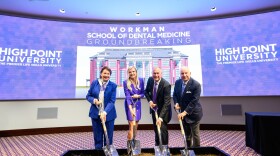When Deah Barakat was an undergraduate at NC State University, his father bought him a white house about five miles from campus. But Deah, who lived with his parents, didnÔÇÖt move in: He rented out the house and collected rent.
Deah had shown an entrepreneurial spirit since an early age. In his early teens, he learned and helped his father keep the books at a check cashing business the family owned, the father said. And eventually, as a dental student at the University of North Carolina at Chapel Hill, he set out to raise $20,000 and convince dentists and classmates to travel with him to Turkey for a week to give free dental treatment to people displaced from Syria.
DeahÔÇÖs family has been using DeahÔÇÖs old house to keep alive the legacy of Deah, his wife Yusor Abu-Salha and his sister-in-law Razan Abu-Salha, who were killed in Chapel Hill a year ago.
Sitting on a lawn in front the house, Deah's older brother, Farris, recently explained they want to emblazon a Martin Luther King Jr. quote around the porch: ÔÇťDarkness cannot drive out darkness; only light can do that. Hate cannot drive out hate; only love can do that.ÔÇŁ
ÔÇťIt ties in with the theme of light and darkness,ÔÇŁ Farris Barkat says, ÔÇťAnd being able to respond to something so hateful with more unity.ÔÇŁ
ItÔÇÖs been a long road for the Barakat and the Abu-Salha families. Their children were college students with bright futures: Razan, 19, was a freshman architecture student at NC State University; Yusor, 21, had recently been accepted to the UNC School of Dentistry; and Deah, 23, was a second-year dental student at UNC.
Their deaths have been on their families' minds every day. DeahÔÇÖs sister recently gave live on a stage for the storytelling show The Moth.
On the afternoon of Feb. 10 last year, Deah rode a bus for 10 minutes from the dental school to Chapel HillÔÇÖs Finley Forest condominiums, and when he got off the bus stop, he took a photo with a classmate who was wearing the same type of jacket.
When Deah arrived to the apartment, Yusor and Razan were making dinner. Minutes later, a neighbor, Craig Hicks, knocked on the door. Suzanne says Hicks shot Deah four times in his extremities, twice in his arms, and once in the head. Hicks then walked to the kitchen and shot Yusor in the hip and head, walked to Razan and shot her at point-blank range in the back of the head. As Hicks walked out of the apartment, he shot Deah once more in the mouth.
Yet for the families, the details of the murder are perhaps just as painful as what they see as the motive: hatred against their religion.
ÔÇťTo perform something so vile, so gruesome, so wicked, requires acute dehumanization at the minimum, hatred that is deep and well rooted,ÔÇŁ Suzanne says.
ÔÇťThe climate that weÔÇÖre in, one that allows public figures, no matter where they are in the political spectrum, from Ben Carson to Bill Maher, to sweepingly bash Muslims, undoubtedly played a role in fueling this hatred.ÔÇŁ

So in a year in which most of America seemed to be tuned into the ISIS channel, the Barakat and Abu-Salha families carried out charitable work their children started or inspired. After the shootings, Deah's online fundraiser for his dental relief trip to Syria, swelled from $14,000 to more than $500,000 in donations. The families donated $50,000 to the Syrian American Medical Society for dental relief, they said. And they used the remaining funds to create an endowment administered by United Muslim Relief for refugee relief, and educational and social service efforts.
In late July, Deah's father Namee Barakat and Farris Barakat traveled in Deah and YusorÔÇÖs place with more than 40 volunteers to help people needing urgent dental care in the small Turkish city of Reyhanli, a busy crossing point with Syria. Over two weeks, the volunteers helped more than 700 patients, giving cleanings, fillings, extractions and other treatments.
In Raleigh, friends and family started spending weekends remodeling the house Deah owned on the corner of Tarboro and Jones streets in the North Central neighborhood of Raleigh. At first, Ferris estimated the project would take two weeks, but after eight months of tearing down walls, sanding floors and upending the wood boards on the porch, they house is still a work in progress.
Farris says his the building will be home to several projects: an incubator for small businesses, after-school programs for high school students and a non-profit he and others have started with the objective of helping shape the narrative of Islam in America. Farris has named the non-profitÔÇöand the buildingÔÇöThe Lighthouse, after Deah, which in Arabic means "light."
What does Farris think Deah would say about the house?
ÔÇťI hope he would be proud," Farris says. ÔÇťBut I imagine he has a better house where heÔÇÖs at.ÔÇŁ
I have a dream one day, to have a unified and structured community. Have a voice in our society and support the youth with their projects
— Deah Barakat (@arabprodigy30)










